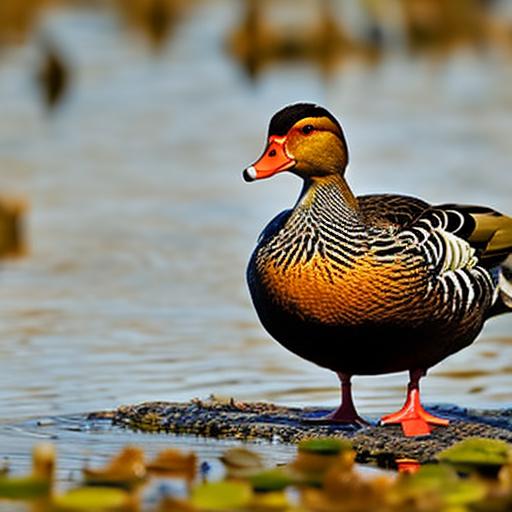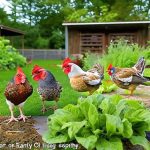Keeping ducks and chickens together in a mixed flock can be a rewarding and beneficial experience for poultry enthusiasts. Not only does it add diversity to the flock, but it also provides pest control benefits and takes advantage of the complementary foraging habits of ducks and chickens. As someone who has personally kept ducks and chickens together, I can attest to the joy and satisfaction that comes from observing these two species interact and thrive in harmony.
Key Takeaways
- Keeping ducks and chickens together can be a great way to diversify your flock and increase productivity.
- Ducks and chickens have different needs and behaviors, so it’s important to understand their differences before integrating them.
- Adequate housing and access to water are crucial for both ducks and chickens, but ducks require more space and water than chickens.
- Feeding ducks and chickens together is possible, but it’s important to provide separate feeding areas to prevent competition and ensure proper nutrition.
- Predators can be a threat to both ducks and chickens, so it’s important to implement security measures to protect your flock.
The Benefits of Raising Ducks and Chickens Together
One of the main benefits of raising ducks and chickens together is the increased diversity in the flock. Ducks and chickens have different physical characteristics, behaviors, and nutritional needs, which adds variety and interest to the flock. Additionally, having both ducks and chickens can provide pest control benefits. Ducks are known for their love of snails, slugs, and other garden pests, while chickens excel at catching insects like flies and mosquitoes. By having both species in the flock, you can naturally control pests without the need for chemical interventions.
Another advantage of keeping ducks and chickens together is their complementary foraging habits. Ducks are excellent grazers and will happily munch on grass, weeds, and other vegetation. Chickens, on the other hand, are more inclined to scratch the ground in search of insects and seeds. By allowing them to forage together, you can ensure that your yard or pasture is thoroughly explored and utilized by both species.
Understanding the Differences between Ducks and Chickens
Before deciding to keep ducks and chickens together, it’s important to understand the differences between these two species. Ducks have distinct physical characteristics such as webbed feet, waterproof feathers, and a flat bill. Chickens, on the other hand, have claws, non-waterproof feathers, and a beak with a curved shape. These physical differences reflect their different natural habitats and behaviors.
In terms of behavior, ducks are known for their love of water. They enjoy swimming, splashing, and dabbling in shallow water. Chickens, on the other hand, are not as fond of water and prefer to stay dry. Ducks are also more social and tend to form tight-knit groups, while chickens are more independent and territorial.
Nutritionally, ducks and chickens have different dietary requirements. Ducks require a higher protein diet, especially during their growing phase and when they are laying eggs. Chickens, on the other hand, can thrive on a lower protein diet. It’s important to provide appropriate feed for each species to ensure their nutritional needs are met.
Housing Requirements for Ducks and Chickens
| Animal | Minimum Housing Requirements | Recommended Housing Requirements |
|---|---|---|
| Ducks | 4 square feet per duck | 10 square feet per duck |
| Chickens | 2 square feet per chicken | 4 square feet per chicken |
When it comes to housing ducks and chickens together, there are a few considerations to keep in mind. Firstly, the coop and run should be spacious enough to accommodate both species comfortably. Ducks require more space than chickens due to their larger size and need for water access. It’s important to provide a separate area for ducks to swim and splash in, as well as a dry area for chickens.
Water requirements are another important consideration when housing ducks and chickens together. Ducks need access to water for swimming and cleaning their feathers. This can be provided through a small pond or a shallow container that is regularly filled with fresh water. Chickens, on the other hand, only require access to drinking water.
Nesting boxes should be provided for chickens to lay their eggs in. Ducks, however, do not require nesting boxes as they prefer to lay their eggs in hidden spots or in tall grass. Providing suitable nesting areas for both species will ensure that they have a comfortable and secure place to lay their eggs.
Feeding and Watering Ducks and Chickens
Feeding ducks and chickens in a mixed flock requires careful consideration of their different dietary needs. Ducks require a higher protein diet compared to chickens, especially during their growing phase and when they are laying eggs. It’s important to provide a feed that is specifically formulated for ducks, which typically contains around 16-18% protein. Chickens, on the other hand, can thrive on a lower protein diet of around 14-16%.
Watering options for mixed flocks should take into account the different water requirements of ducks and chickens. Ducks need access to water for swimming and cleaning their feathers, while chickens only require access to drinking water. Providing a small pond or shallow container for ducks to swim in, as well as a separate water source for chickens, will ensure that both species have their needs met.
Supplemental feeding considerations should also be taken into account when keeping ducks and chickens together. Ducks enjoy foraging for insects, snails, and other small creatures, so providing them with access to a grassy area or pasture can help satisfy their natural instincts. Chickens, on the other hand, will appreciate access to a chicken-friendly garden where they can scratch for insects and eat fresh greens.
Health Considerations for Mixed Flocks

Keeping ducks and chickens together in a mixed flock requires careful attention to their health needs. Both species are susceptible to certain health issues, so it’s important to take preventative measures and be prepared to treat any potential problems.
Common health issues for ducks include respiratory infections, parasites such as mites and worms, and foot problems. Chickens are prone to respiratory infections, parasites such as lice and mites, and egg-related issues such as egg binding or prolapse.
Preventative measures for both ducks and chickens include regular health checks, proper nutrition, clean housing conditions, and vaccination if necessary. It’s also important to provide appropriate shelter from extreme weather conditions and predators.
Treatment options for health issues in mixed flocks may vary depending on the specific problem. Consulting with a veterinarian who specializes in poultry health is recommended if you encounter any serious health issues in your flock. In some cases, natural remedies or over-the-counter treatments may be sufficient, while in other cases, prescription medications may be necessary.
Managing Flock Dynamics: Integrating Ducks and Chickens
Integrating ducks and chickens into a mixed flock requires careful management of flock dynamics. Ducks and chickens have different social behaviors and hierarchies, so it’s important to introduce them gradually and monitor their interactions.
When introducing ducks and chickens, it’s best to start with young birds that are around the same size. This allows them to grow up together and establish their own pecking order. It’s important to provide plenty of space and resources to prevent overcrowding and competition.
Monitoring flock behavior is crucial when integrating ducks and chickens. Pay attention to any signs of aggression or bullying, as this can lead to injuries or stress in the flock. If necessary, separate any birds that are causing problems and reintroduce them at a later time.
Addressing aggression issues in mixed flocks may require additional measures such as providing separate feeding areas or adding visual barriers to reduce aggression. In some cases, it may be necessary to permanently separate certain individuals if they cannot coexist peacefully.
Egg Production and Management in Mixed Flocks
Egg production in mixed flocks can be a rewarding experience, as both ducks and chickens are capable of laying eggs. However, there are some differences in their egg laying habits and management.
Ducks are known for their prolific egg laying, with some breeds capable of laying over 200 eggs per year. They typically start laying eggs at around 5-6 months of age and continue throughout their adult life. Ducks also have a longer laying season compared to chickens, with some breeds capable of laying eggs year-round.
Chickens, on the other hand, have a more predictable egg laying pattern. Most chicken breeds start laying eggs at around 5-6 months of age and have a peak laying period of around 2-3 years. After that, egg production gradually declines. Chickens also have a natural molting period where they stop laying eggs for a few weeks to several months.
Collecting and storing eggs in mixed flocks requires separate nesting areas for chickens and ducks. Chickens will typically lay their eggs in nesting boxes, while ducks may lay their eggs in hidden spots or tall grass. It’s important to collect eggs regularly to prevent them from being damaged or eaten by predators.
Maximizing egg production in mixed flocks can be achieved through proper nutrition, clean housing conditions, and providing appropriate lighting. Ducks and chickens both require a balanced diet that is high in protein and calcium to support egg production. Providing supplemental lighting during the winter months can also help stimulate egg laying in both species.
Predators and Security Measures for Ducks and Chickens
Predators can pose a threat to mixed flocks, so it’s important to take appropriate security measures to protect ducks and chickens. Common predators for mixed flocks include raccoons, foxes, coyotes, dogs, cats, and birds of prey.
Coop and run security measures should include sturdy fencing that is buried at least 12 inches deep to prevent digging predators from gaining access. The coop should have secure doors and windows that are predator-proof, with no gaps or holes that predators can squeeze through. Adding hardware cloth or wire mesh to windows and vents can help prevent entry by smaller predators.
Free-ranging considerations should also be taken into account when keeping ducks and chickens together. Ducks are more vulnerable to aerial predators such as birds of prey, so it’s important to provide them with cover or shelter when they are outside. Supervised free-ranging during the day is recommended to minimize the risk of predation.
Is Keeping Ducks with Chickens Right for You?
In conclusion, keeping ducks with chickens in a mixed flock can be a rewarding and beneficial experience for poultry enthusiasts. The benefits of increased diversity, pest control, and complementary foraging habits make it an attractive option for those looking to expand their flock.
However, it’s important to understand the differences between ducks and chickens in terms of their physical characteristics, behaviors, and nutritional needs. Providing appropriate housing, feeding, and watering options is crucial to ensure the health and well-being of both species.
Managing flock dynamics and addressing aggression issues may require careful monitoring and intervention. Egg production and management in mixed flocks can be maximized through proper nutrition, clean housing conditions, and appropriate lighting.
Predators pose a threat to mixed flocks, so it’s important to take appropriate security measures to protect ducks and chickens. Coop and run security measures should be implemented, and free-ranging should be supervised to minimize the risk of predation.
Ultimately, the decision to keep ducks with chickens is a personal one that depends on individual preferences and circumstances. If you have the space, resources, and commitment to provide for the needs of both species, keeping ducks with chickens can be a rewarding and enjoyable experience.
If you’re considering keeping a duck with your chickens, it’s important to understand the dynamics between these two species. While it is possible for ducks and chickens to coexist peacefully, there are certain factors to consider. One article that provides valuable insights into this topic is “Can Guinea Fowl Live with Chickens?” This article explores the compatibility of guinea fowl and chickens, shedding light on the potential challenges and benefits of keeping these two birds together. To learn more about this topic, check out the article here.
FAQs
What are the benefits of keeping a duck with chickens?
Keeping a duck with chickens can provide several benefits such as increased egg production, pest control, and improved soil quality.
What are the potential drawbacks of keeping a duck with chickens?
One potential drawback of keeping a duck with chickens is that ducks require more water than chickens, which can lead to wet and muddy conditions in the coop. Additionally, ducks may have different dietary needs than chickens, which can be challenging to manage.
What should I consider before introducing a duck to my chicken flock?
Before introducing a duck to your chicken flock, you should consider the size of your coop and run, the temperament of your chickens, and the dietary needs of both chickens and ducks. It is also important to ensure that the duck has access to adequate water and that the coop is kept clean and dry.
How can I ensure that my duck and chickens get along?
To ensure that your duck and chickens get along, it is important to introduce them gradually and supervise their interactions. Providing plenty of space and resources, such as food and water, can also help prevent conflicts.
What should I feed my duck and chickens?
Chickens and ducks have different dietary needs, so it is important to provide them with separate feeders and appropriate feed. Chickens typically require a diet high in protein, while ducks require more niacin and other nutrients. Consult with a veterinarian or poultry expert for specific dietary recommendations.
Meet Walter, the feathered-friend fanatic of Florida! Nestled in the sunshine state, Walter struts through life with his feathered companions, clucking his way to happiness. With a coop that’s fancier than a five-star hotel, he’s the Don Juan of the chicken world. When he’s not teaching his hens to do the cha-cha, you’ll find him in a heated debate with his prized rooster, Sir Clucks-a-Lot. Walter’s poultry passion is no yolk; he’s the sunny-side-up guy you never knew you needed in your flock of friends!







